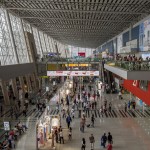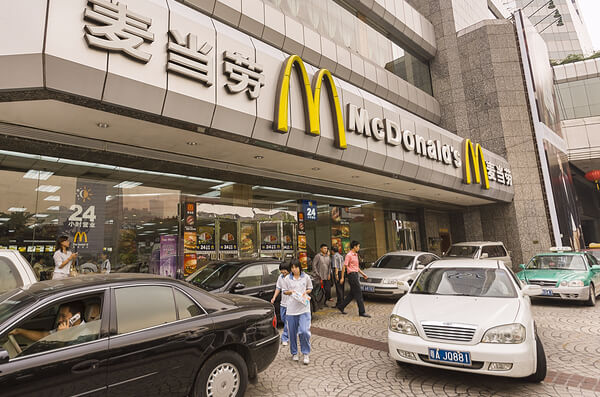
‘China’ in Chinese (Zhong Guo, 中国) means ‘The Middle Kingdom,’ and it’s lived up to its name establishing itself as the business center of the world. China hosts millions of travelers each year, of which many come in pursuit of meeting local companies, establishing working relations, and finding factories that suit their product needs.
In order to handle the volume of visitors, and of its own local residents, transportation infrastructure and convenience is key. With over 1.3 billion people living in China and 80% of them using public transport, navigating through its major cities can quickly become a nightmare.
Many road signs are only in Mandarin, so trying to drive yourself around is almost an impossibility. So, why not rent a car with a professional local driver to have full flexibility, independence, and convenience during your trip? Below are some of the reasons why it’s wiser to rent a car and driver when doing business in China.
Whether it’s your first time visiting the middle kingdom, or you’re a regular, the reality is that China’s cities face ongoing challenges relating to transport. Over the last ten years, Beijing has built an impressive subway network, however, air quality and congestion remain major problems.
By hiring a driver, you can avoid the trouble of having to get a Chinese driver’s license in order to drive yourself around. Renting a car with a driver gives you one less thing to worry about when traveling in a foreign country.
Flexibility is another great advantage, as you can always choose where and when to travel. In this way, you’ll be avoiding traffic peak times and making your way to your 8am meeting well-prepared, well rested, and even with some spare time in the car to go over your meeting notes.
In your executive car, you’ll enjoy the full comfort of a trusted vehicle that no local taxi or public transport can provide. You won’t have to make any connections, transport switches, or worry about having to make sure the taxi driver isn’t taking the long route. Rather, you’ll have time to sit back and catch up on some work.
As mentioned earlier, most large cities are very well connected with their subway systems. This economic and quick method of traveling may seem convenient, however, most factories and offices lie outside of its immediate reach. You’ll have to find your own way to your destination via foot or by hailing a taxi when you arrive at your closest subway station.
This is why most business travelers prefer to hire a car for the day, or even half the day, and ensure they can get wherever they need to efficiently.
No matter how many Mandarin lessons you’ve had, there might always be that one road sign that will throw you off, or that one person who gives you directions in Mandarin, but you can barely understand what they mean.
In as much as there are numerous services trying to cover this gap in the traveler’s market, very few seem to offer an all-inclusive package. Make sure you pick a car service provider that offers bilingual and/or multilingual drivers with years of professional driving experience. Your driver can be your interpreter while you’re off shopping for souvenirs for the family back home.
Insider tip: As most companies would rather work with someone they can communicate easily with, we recommend that you hire a qualified interpreter for your business trip to China. Especially in today’s globalized economy, there’s no downplaying the importance of translation services during your overseas trips.
A good car service provider will help you avoid traffic jams and routes with construction delays. A knowledgeable driver will increase the efficiency of your trip being ‘homebred’ with experience.
This way, you won’t have to worry about missing any important appointments during your trip. For example, business dinners are a very important event in China. When doing business with a Chinese company, it really pays to accept their dinner invitation as these are usually a precursor to closing a deal.
When you rent a car with a driver, you can guarantee you’ll get to dinner on time. What’s more, with an English speaking driver, you may even be able to receive a crash course on the basics of business dinner etiquette in China, while you’re making your way there.
Insider tip: Business dinners in the mainland usually begin at 6 or 6:30. The host of the dinner will sit at the head of the table facing the door and, as the company’s guest, you should sit directly across from him if the table is rectangular (if it’s a round table you’ll be seated to their right).
It’s important you never pour your own beverage, and make sure the glasses of those next to you are always full. Find more tips in our Chinese deal-making process article.
Preparing for a trip to China? A private transfer is the safest, quickest way to travel from the airport to the city. China Car Service is a trusted transportation service helping business travelers for almost two decades. We provide door-to-door service at competitive prices.Make your journey stress-free and contact our 24/7 team at Bookings@ChinaCarService.com with questions, or get a quote below. Use this promo code: 10CARBLOG to get a $10 discount on your 1st service. |
As the world’s largest automobile market, China will continue to move towards having more cars on their roads. Although, more cities are placing car restrictions in response to the over-congestion and air pollution concerns.
In July 2016, Guangzhou rolled out a vehicle license quota, modeled after Shanghai, Beijing, and Guiyang. Along with Guangzhou, the three largest cities in China limit vehicle purchases to stem the tide of private auto ownership.
This type of restriction is found in a few other countries, like Singapore. In China, however, due to the immense number of people on the road, it’s become a necessary regulation.
Therefore, it’s important to find a car service that abides by these rules and avoids road hassles with authorities. Given that one cannot drive in China without a Chinese driver’s license, the perfect alternative is to simply rent a car with a driver to avoid the hassle.
Insider tip: Be wary of the time of the year when you decide to have your business trip. If possible, avoid planning your business trip on the three golden weeks in China, which are:
During these times most people in China will also be on holidays. This tends to create an incredible crowding of transport systems as well as tourist destinations.
Using a Chinese car service provider makes the experience authentic and community-unique. Local drivers will know their way around the city you’re traveling to and can offer valuable advice on which places to see, and at what times they’re least crowded.
Though China has its own share of big chain stores and restaurants, there are still many local places to visit that still carry that unique traditional culture. Often locals will visit foreign restaurants as a break from the usual but they’ll never replace the small diners down the street where they choose to have their breakfast each morning.
By supporting those local businesses, instead of the chains, you ensure they keep their doors open and that you experience the some genuine culture that may otherwise be overshadowed.
China is no longer just the world’s factory. It’s also become one of the world’s largest buyers, as well as a key business center. Hence, when traveling to China it’s important to:

Traveling to a foreign country, whether you’re a newcomer or a seasoned traveler, can be made a whole lot easier with the help of a few useful apps. In recent years, new apps have changed the game for travelers worldwide. Downloading these helpful apps onto your smartphone before arriving in China will undoubtedly improve your experience.
Continue reading

As a frequent business traveler, you’re probably familiar with using various methods of transportation to get from point A to B. For pure convenience and freedom, you might wish to rent a car for the duration of your trip.
However, in a country like China, driving yourself can be a lot more complicated and risky than in the West. It’s highly recommended that you hire a driver or use alternative modes of public transport rather than driving yourself. In this blog post, we’ll explore the reasons why foreigners shouldn’t drive in China while on a China business trip.
Before even considering driving in China you need to be aware that an International Driver’s Permit (IDP) and an Overseas Driver’s License are not recognized by the Chinese government. Therefore, if you want to drive, you’ll need to apply for a Chinese driver’s licence first.
There are several ways of obtaining a Chinese driver’s license. Though the process itself isn’t actually costly, it can be very time consuming and troublesome, which is something you’d probably rather avoid while on a business trip.
Also, a prerequisite to drive in China is having a valid Chinese Visa for no less than 90 days. There is a silver lining, thankfully, if you decide to obtain a Chinese driver’s license, your license will be valid for 7 years.
Rather, arranging transport for your business trip in China can be very quick and simple. You can handle these details ahead of time and land in China knowing everything is already prepared.
Here’s everything you need to know about getting a Chinese driver’s license.
Preparing for a trip to China? A private transfer is the safest, quickest way to travel from airport to the city. China Car Service is a trusted transportation service helping business travelers for almost two decades. We provide door-to-door service at competitive prices.Make your journey stress-free and contact our 24/7 team at Bookings@ChinaCarService.com with questions, or get a quote below. Use this promo code: 10CARBLOG to get a $10 discount on your 1st service. |
In China, cars drive on the right-hand side of the road and overtake on the left. On occasion, however, it feels like the common saying ‘every man for himself’ applies with regards to the driving culture in China. Unfortunately, there are many inexperienced drivers on the road due to the fact that China experienced a massive growth in the number of privately owned cars in such a short timeframe (just 10 years).
China also has the world’s highest per capita rate of vehicular fatalities. This can likely be attributed to the fact that the government doesn’t enforce strict rules of the road. According to the World Health Organization (WHO), over 700 people die in China per day as a result of traffic accidents.
Chinese driving culture has popularly followed an unwritten rule of the road called ‘The Law of the Big.” This basically means that all bigger vehicles, like trucks, are the kings of the road and always have the right of way, causing all other cars to always move out of their way for fear of being pushed off the road.
Buses take second place as they swing from right to left, searching for small gaps in traffic, not paying any attention to the cars and motorbikes that they muscle off of the roads.
Cars and motorbikes are known for using their horns far more often than their breaks and frequently skip red traffic lights without batting an eye, drive up one-way streets, and certainly don’t stop for pedestrians.
In China, you’ll also regularly see many fully overloaded vehicles and scooters which are a huge safety risk. You’ll need to have a lot of confidence and experience as a foreigner driving in China. It’s always better to hire a professional local driver to get you around, preferably with years of experience driving on Chinese roads.
Being in a foreign country, it’s expected to experience difficulty understanding some of the signs in and around the city. In China, however, what makes it so difficult is that some of the signs are already very confusing to begin with.
You may find that some roads have two different speed limits on the same road. Some signs even appear to completely contradict your navigation system, as many roads tend to have two or three different versions of English names.
Imagine driving in China, trying to adjust to the hectic driving style, while also trying to navigate with road signs that don’t make any sense. This basically sets you up for failure before you’ve even begun.
Even though many of these signs have been corrected after the 2008 Beijing Summer Olympics, it’s still common to find signs in China that have been translated directly into English but are complete linguistic disasters that don’t make any sense.
Traffic and road accidents in China are a growing problem, due to China’s booming auto manufacturing industry. Add to this the fact that China has rapidly urbanized over the past few decades, since opening in gates in 1979.
In China, the traffic fatality rate per 100,000 cars is 35 which is double that of the United States. A large contributor to this fact is the low quality of China’s driver education system. China’s Driving Schools usually only offer driving classes on closed courses and, as a result, many people get behind the wheel to take on the roads for the first time only after they’ve graduated.
Corruption is also a major problem in China, which sees many drivers on the road who have never taken a single driving test. Additionally, many Chinese drivers don’t have car insurance, so if they cause a car accident, most of these cases will become ‘hit and run’.
Traffic is a problem in every major city, but traffic in China is an ongoing problem and many citizens have had to become accustomed to the new phenomenon called ‘gridlock’ which didn’t exist a few decades ago.
As an indication of China’s mega traffic jams, you might recall the China National Highway 110 traffic jam which occurred a few years ago and was 60 miles long! It involved thousands of cars and lasted more than 10 days. Driving yourself will only waste your valuable time in China and will add unnecessary stress.
The better, more reliable, stress-free solution is to take public transport or hire a private car service with a local driver. This will give you extra time to respond to emails and prepare for meetings, making the most of your time in the inevitable traffic problem in China.
If you’re planning on visiting more than one city in China, one of the safest travel options is to use the high-speed trains for long-distance trips.

Like most people, after a long flight, all you want to do is leave the airport and head straight to your final destination. The absolute last thing you want to do is fall victim to one of various scams in China that can happen unexpectedly.
Below, we discuss the top 4 China scams that travelers suffer while on business trips and how you can avoid them. Being aware of what to look for to avoid scams in China could make a major difference in the experience of your trip. After all, better safe than sorry.
“Black” taxis don’t get their name from the color of their car, but because they’re illegal taxis whose drivers make a living by overcharging foreigners. These taxis usually don’t have meters or have fake meters, rigged to charge rates that are double the price of regular taxis.
They’ll have several ways of employing their scams. For example, when passengers are traveling in groups, the drivers will agree on a fare and then, once you’ve reached your destination, they’ll clarify the rate was meant per person.
Black taxis are also known for dropping passengers off at an unknown destination and driving off with their luggage once they’ve received their pay.
These scams occur at all major airports, as well as hotels and city attractions. Luckily, it’s easy to avoid this type of scam if you know what to look out for:
Additionally, most taxi drivers in China don’t speak English. If you’d rather travel with a driver you’re sure you can communicate with, hire your own private car to make sure there are never any misunderstandings.
Preparing for a trip to China? A private transfer is the safest, quickest way to travel from the airport to the city. China Car Service is a trusted transportation service helping business travelers for almost two decades. We provide door-to-door service at competitive prices.Make your journey stress-free and contact our 24/7 team at Bookings@ChinaCarService.com with questions, or get a quote below. Use this promo code: 10CARBLOG to get a $10 discount on your 1st service. |
The counterfeit money scam is common all over China. Drivers use it to take advantage of foreigners who aren’t yet familiar with Chinese bank notes.
Thankfully, this is one of the easier scams to avoid. Nevertheless, it’s good to always stay alert. This scam occurs when you’re given back your change, particularly from taxi drivers or tour guides. You’re given fake notes in return, particularly Y50 and Y100 bills.
When purchasing something, vendors may also quickly exchange one of your authentic notes for a fake one and accuse you of giving them counterfeit money. If you didn’t see the exchange, you can’t hold them liable. Here’s how to avoid it:
Here’s everything you need to know about How to Use an ATM in China and How to Open a China Bank Account.
Beggars and pickpockets are common in cities all over the world. In China’s main tourist areas (like in Beijing’s Silk Alley), foreigners are targeted by beggars, as it’s easier to obtain a donation from Westerners than locals.
However, many of these beggars aren’t actually poor, they’re just looking to make a quick buck off of you by being extremely persistent. You’ll be approached by various types of beggars, such as ‘Aggressive beggars’ who aren’t afraid to touch or tug on your clothes until you give them something.
Some beggars will approach you pretending to have a disability. They’ll shove a piece of paper in your hands, claiming that it’s for a ‘cause’ which you need to support. Don’t fall victim to the fake monks either, (usually in Hong Kong) who dress up in official attire and present a donation book, asking for your donation.
Carrying cash in China is essential for taxis and shops that don’t accept foreign credit cards. This, however, makes you a prime target for pickpockets. They’ll work in pairs. One accomplice will distract you by asking you intrusive questions while the other quickly grabs your wallet, cell phone, or anything he can get his hands on. This frequently occurs in busy areas such as markets, subways, and taxi lines.
To avoid beggars and pickpockets from taking advantage of you:
Find out more about Petty Crime Areas in China to Watch Out For and How to Avoid Crime In China.
This type of scam is very popular in places like Beijing (at The Wangfujing shopping district and Houhai Lake nightlife district) and Shanghai (at The Nanjing Road shopping district and People’s Park). Solo males who are on a business trip are often prime targets for this type of scam.
A young female Chinese student will approach you alone or with two or three of her friends and offer to show you around personally, as it will ‘improve their English.’ They hope that, as a Westerner, you’re delighted to have some cultural interactions while on your trip and will happily respond with a ‘yes!’
Sometimes, they’ll catch you off-guard by claiming to be tourists, too. You likely won’t expect to be conned by a fellow tourist. Soon after, you’ll be invited for tea at a nearby restaurant. After your dining experience, however, the students will quickly disappear to the restroom. When the bill arrives, you’ll be shocked to find an exorbitant price!
There’s no use trying to explain the circumstance to the owner, he “won’t speak English” and is working together with the scammers. Ultimately, you’ll end up paying the full amount or the owner will call his friends at the police to come and force you to pay.
Here’s how to avoid this type of scam:
If you find this blog useful, please feel free to share it!
Have you ever been the victim of a China Scam? What have you or your associates experienced?

Doing business in China is very different from doing business in the West. It’s important to be prepared and to know what to expect in order to avoid any detrimental loss of business due to mere misunderstandings.
If you’re a regular business traveler to China, you most probably know many tricks of the trade Nevertheless, refreshing your memory and being well-informed can go a long way. In this post, we help you understand the ever-growing Chinese business culture.
For the most part, Westerners are used to shaking hands as a form of greeting. In China, however, a slight nod is the more common. You may be offered a handshake, but it’s important you wait for your Chinese counterpart to offer their hand first.
Formal introductions are very important to the Chinese. It’s the first step to establishing an interpersonal relationship. Therefore, it’s important to take note of these when they’re mentioned. Most people will be addressed by a title followed by their name and it’s important for you to do the same.
For example, when addressing people, refer to their professional title such as ‘Director Wang’ or ‘General Manager Lee.’ It’s considered rude to introduce yourself, so when being introduced, stand up, smile, and make eye contact for the duration of the introductions.
Insider tip: Applause is common when greeting a crowd and reciprocation is expected.
One key aspect of Chinese culture is the concept of Mianzi (pronounced Mi-en-tzuh) which literally means ‘face.’ Face can be described as a mix of public perception, social role, and self-esteem that has the potential to either destroy or help build relationships.
Therefore, it’s very important you never cause a Chinese business person to ‘lose face’ by insulting, criticizing, or making fun of them in public. An entrepreneur can gain face by attending meetings, accepting invitations, giving gifts or compliments, and showing sensitivity to Chinese culture.
Insider tip: When making a toast in honor of your Chinese counterpart, make sure that your glass is below theirs. This way, you maintain respect by giving them face.
Small talk is particularly important at the beginning of the meeting. Popular topics about China to begin with are generally safe, such as landmarks, art, scenery, climate, and geography.
Try to stay away from politics unless you know the person very well. Also, Chinese business people will appreciate it if you’re able to say a few Chinese words, but this is not expected (so don’t worry if you can’t). Rather, avoid this if you’re not comfortable or aren’t 100% sure of what the words mean.
The Chinese often ask questions such as ‘Where have you been?’ and ‘Have you eaten?’ which are equivalent to Westerner’s ‘How are you?’ Don’t take the question literally, simply smile and say ‘yes’ or ‘thank you.’
The Chinese don’t like to say ‘no’ as it can cause embarrassment and loss of face. If a request can’t be met, you might be told that it’s inconvenient or ‘Yes, but it may be difficult.’ Although that may seem like a positive response, it most probably means no. The Chinese also nod as acknowledgment that you are being heard, rather than symbolizing ‘yes’ so it’s important to take note of that.
Insider tip: During conversation, never criticize China or Chinese leaders and certainly don’t refer to Hong Kong as if it was still run by another administration. The same goes for Taiwan, Tibet, and Xinjiang as a separate entity.
Learn 8 Chinese phrases for Business to make you sound humble.
Guanxi 关系 (pronounced gwan-shee) which literally means ‘relationship’ is extremely important to the Chinese. Chinese business people see mutual trust and respect as a vital part of the business relationship and will often meet up several times in order to establish that relationship before closing the deal.
Therefore, the deal closing process may take time and they’ll appreciate your patience. Also, people in China will enter the boardroom in order of hierarchy so the delegate of the meeting will usually enter first. Wait for the appropriate time to enter the room.
For meetings, you’re expected to arrive on time or earlier and to be well prepared. So make sure you bring several copies of all documents to your meeting. Further, when handing out brochures or documents, make sure you start with the most senior person in the room, handing things over with two hands. Using only one hand when handing something over is considered very rude. Lastly, it’s important to remain composed at all times. Rather than showing too much enthusiasm or emotion when closing a deal, show acknowledgment with a faint smile or nod.
Insider tip: You may find that once both sides have met, Chinese businessmen may use the newly found friendship to reach concessions. For example, the Chinese side may mention to foreigners that true friends would reach an agreement that is of maximum mutual benefit. As with any deal, make sure that the benefit is genuinely mutual and not just one-sided.
Preparing for a trip to China? A private transfer is the safest, quickest way to travel from the airport to the city. China Car Service is a trusted transportation service helping business travelers for almost two decades. We provide door-to-door service at competitive prices.Make your journey stress-free and contact our 24/7 team at Bookings@ChinaCarService.com with questions, or get a quote below. Use this promo code: 10CARBLOG to get a $10 discount on your 1st service. |
It’s important to be aware of your hands. Generally, the Chinese don’t use their hands when talking, as it’s considered rude and distracting. Pointing at something with your index finger is also considered rude. Use an open hand, instead.
Chinese business culture sees people continuously acting in a very formal manner, so it’s vital to remain calm and collected at all times. Touching your mouth with your hands, biting your nails, or removing food from your teeth is also considered incredibly impolite.
Insider tip: The Chinese don’t like to be touched, particularly by strangers. However, Westerners often feel that the Chinese comfort zone (regarding physical distance) is a bit too close for comfort. Don’t be surprised if when you’re conversing, you feel a slight invasion of your personal space.
Always dress in formal attire for meetings, as a sign of respect, and stay away from any bright colors (as they’re considered inferior). On your way to the meeting, being punctual is as important to the Chinese as to Westerners. Make sure to leave with plenty of time to make sure you arrive a bit earlier.
Exchanging business cards is another honorable act in Chinese business culture, as it contains your formal name and title. When handing your business card to another person, always use two hands to show respect. Be sure to stand before doing so, if you’re sitting.
Once the meeting has come to an end, you’re expected to wait for your Chinese counterparts to leave first. If you’re the host of a meeting, it’s proper etiquette to send a representative to meet your guests outside the boardroom or building and to escort them to the meeting room. The host should escort the guests to their seats.
Insider tip: Never write on a business card, or put it straight into your pocket or wallet. Carry a small business card case with you instead.
If you’re invited for a business meal, wait to be seated, as there is a seating process based on hierarchy. Also, don’t discuss business straight away. It’s common to begin with small talk before any formal business conversation begins.
While at dinner, pace yourself, as you may be served 20 to 30 dishes throughout the course of the evening. However, be careful not to leave your plate empty, as that’s a sign of not being given enough food. An empty plate can be interpreted as ‘I’m still hungry,’ and it may cause your host to lose face.
Try not to reject anything, rather taste a bit of everything. You don’t have to finish it, but it’ll be rude if you don’t even try it. After the dinner, being invited for drinks is a good sign, as you’re given the opportunity to build your business relationship with your counterparts.
At this point, you might be tested on your ability to consume alcohol. Throughout the dinner, remember never to drop your chopsticks or place them parallel, on top of, or in the bowl. There should be a chopsticks holder, or at least rest them diagonally on the plate. Remember not to leave a tip after the meal, as this may also be considered rude.
Insider tip: Never eat or drink before your host, and always offer someone else food or drinks before you serve yourself. Never take the last piece of anything, this is considered bad luck and as a sign that you’re greedy.

The Canton Fair sees about 24 000 exhibitors, 204 000 buyers, and 60 000 booths twice every year. The fair holds its place as one of the oldest trade fairs in history.
If you’re looking for expert tips on how to make your Canton fair experience easier, you’ve come to the right place. Here, we walk you through how to get to the fair, what spots to grab a bite, how to save time on queuing, getting around once inside, and more. Here’s the Businessman’s Expert Canton Fair Guide:
Starting off with some basic information for the Canton Fair, there are 2 sessions held each year. One session takes place in April that runs into early May, while the second session is in October and runs into early November. Each session has three phases:
Each day, the fair starts at 9h30 – and closes at 18h00, but be warned, many suppliers pack up their booths as early as 12h00 on the last day, so don’t wait until the last minute to do your final sourcing and purchases.
For more information on the different phases, visit the Canton Fair’s official website.
Attending the Canton Fair is completely free for buyers, you’ll just have to register online beforehand. On the site, scroll down to the ‘Overseas Buyers’ section and follow the easy instructions on how to apply for your invitation letter (which can be used to obtain your visa) and your Buyer’s Badge.
You can also get straight to applying for these two by using the BEST (Buyer E-service tool) and find an easy guide on how the BEST tool works. The registration process will take 3 to 7 working days to confirm and you’ll be emailed a “return receipt of confirmation buyers badge pre-application” on the day.
The Buyer’s Badge is the only official admission to the Canton Fair and grants you unlimited access to the fair. It can be claimed at the Canton Fair Hong Kong Representative Office or, alternatively, at the Overseas Buyers Registration Offices in Appointed Hotels (which is great for avoiding long queues). Here’s a list of all the hotels in Guangzhou that provides this service.
As you prepare to attend the Canton Fair, the first order of business is how to actually get to Guangzhou.
It’s important to book your flights well in advance, as only a few countries have services that fly directly into Guangzhou Baiyun Airport. Also, we can guarantee those flights will be fully booked if you wait too long to book. Here’s a list of various transport methods from Guangzhou Baiyun Airport to the Canton Fair Complex.
Most international carriers fly into Hong Kong, which is your closest major hub. If this is the case, you’ll need to navigate your way from Hong Kong to your Guangzhou hotel by taking the Intercity train (which is well sign-posted in English), directly into Guangzhou, which will take around 2 hours (and cost about US$70).
Alternatively, you could take a taxi, bus, or a door-to-door private car service which will roughly be 3.5 hours. For the former two options, always take cash with you as ATMs aren’t always available.
The most convenient option is to hire a private car with a driver in Guangzhou, as this gives you peace, comfort, flexibility, and assurance that you won’t be overcharged or trapped in cramped conditions which is common with public transport in China.
It’s important to book your accommodation well in advance as most of the hotel rooms will be fully booked during the trade fair. Additionally, booking a few months in advance will help save money, since hotel rates go much higher during the Canton Fair season.
Ensure that the accommodation you’ve booked is in close proximity, if possible within walking distance, to The Pazhou complex. This is simply for general convenience and to help avoid any delays that may occur en route to the show. Particularly as traveling in a foreign country can be confusing for anyone. This is also beneficial if you want to see more of the nightlife, from the bars and restaurants.
We recommend staying at The Garden Hotel Guangzhou, The Shangri-La Changzhou, and The Westin Pazhou Guangzhou. These are 3 very famous Guangzhou hotels that most taxi drivers know the English names of.
Here is a full list of best hotels in the Guangzhou area that suit all budgets.
Preparing for a trip to China? A private transfer is the safest, quickest way to travel from the airport to the city. China Car Service is a trusted transportation service helping business travelers for almost two decades. We provide door-to-door service at competitive prices.Make your journey stress-free and contact our 24/7 team at Bookings@ChinaCarService.com with questions, or get a quote below. Use this promo code: 10CARBLOG to get a $10 discount on your 1st service. |
The Pazhou complex is conveniently located on Pazhou Island in southeast Guangzhou. Travel to the complex is easy via taxi, hotel shuttle bus, subway, or car services. Most Guangzhou hotels offer free shuttle services throughout the city during the Canton Fair, however, the bus timetable is very limited and based more on whether the shuttle is full rather than strict timetables.
Find out beforehand if there are any shuttle services to-and-from the fair provided by the hotel you’ll be staying in. In the case that it does, you’ll need to find out where exactly at the Pazhou complex the shuttle will be located and how to recognize the correct shuttle for your hotel. Remember that drivers in Guangzhou won’t speak any English. Alternatively, the metro is also a good choice to arrive at Pazhou, as it’s reliable and cost-effective.
Here’s more information on metro routes and here’s more information on the shuttle busses to the Pazhou complex.
 Be Prepared – Try to arrive 30 minutes to an hour before the fair starts. It’s important to know exactly what products you’re interested in. As well as the number of units you plan on purchasing. Visiting every booth is impossible, so plan ahead of time which booths are highest on your priority list. By setting your goals in advance and knowing what you want to achieve beforehand, during, and after the show, you’ll prevent yourself from wasting valuable time.
Be Prepared – Try to arrive 30 minutes to an hour before the fair starts. It’s important to know exactly what products you’re interested in. As well as the number of units you plan on purchasing. Visiting every booth is impossible, so plan ahead of time which booths are highest on your priority list. By setting your goals in advance and knowing what you want to achieve beforehand, during, and after the show, you’ll prevent yourself from wasting valuable time.
Translators – Although not necessary as many booths have an English speaking vendor, it may be a good idea to look into having an English translator to assist you with negotiations. If you feel that this is for you, there’s a booth in the lobby where you can hire a translator for the day. You can also arrange an interpreter that is familiar with the products and technical terms (in both English and Mandarin) in the industry you are researching.
Business Cards– These are important to remember, as many of the suppliers will be reluctant to hand out their product catalogs if you don’t give them your business card in exchange. Consider having a bilingual business card, and add the country and international dialing code information to your address and telephone number. Make sure you hand over and receive business cards with both hands, this is a sign of respect in China.
Firewall – Remember that in China, nearly anything from Google (including Gmail, Youtube, Maps, etc), to Dropbox, Facebook, and Twitter won’t work. Therefore, prepare for the English and Chinese name of your hotel to show taxi drivers or ask for directions. Also, you can print out this Canton Fair Layout and Transportation Guide for assistance. However, if you wish to have access to these apps while IN China, it’s wise to set up a VPN before arriving in China. This will be crucial for you to stay connected. ExpressVPN and NordVPN can easily be installed onto your phone and other devices.
Food – It’s a wise idea to take your own sandwich, fruit, and bottled water from your hotel if you’re not prepared for Chinese canteen-type food. Alternatively, there’s also a McDonalds but you’ll have to queue up and wait along with hundreds of other people for your meal. That being said, try not to buy food anytime between 12:00 and 14:00 (to avoid waiting in never-ending queues).
If you have any questions regarding the Canton Fair Guide, business travel in China, or any additional tips to share on making the most of the Canton Fair from your own experiences, please let our community know by leaving a comment down below!
China Car Service provides private limousine transfers and personalized ground transportation solutions for foreign business travelers. If you’re attending the Canton Fair and are interested in hiring a private car service from Hong Kong, Shenzhen, or Guangzhou Airports to your Guangzhou Hotel, or plan on visiting suppliers after the Fair, and wish to make the most efficient use of your time, please don’t hesitate to contact us.
Our services are available 24 hours a day and we have a 24 hour English speaking call center with friendly customer service ready to answer any of your questions, by phone or email. We’re also excited to offer you a $10 discount on your first service with our company, redeemable with the promo code 10CARBLOG. Simply click below to send your inquiry.

No matter how experienced a business traveler you are, business travel to China can be quite overwhelming. Nevertheless, there are always methods of improving your travel experience; especially if one such benefit allows you to enter visa-free! This blog is all about providing you with the most useful insider tips in order to help facilitate this process. Therefore, armed with knowledge, your next time traveling in China will be with comfort and ease.
Firstly, almost every foreign visitor to China requires a visa. The Chinese visa can be obtained from the nearest Chinese consulate or embassy. Most travelers choose to visit their local Chinese representative office prior to their departure to have their visa ready upon arrival.
However, if you’re traveling to Hong Kong or Macau, most travelers can obtain a visa-on-arrival (VOA) for up to 90 days. If you’re traveling to either of these two cities and wish to enter Mainland China, you’ll require a visa which you can apply for in Hong Kong. For a list of countries that apply for the visa-free period as well as how to apply for a Chinese visa in Hong Kong, check here.
Luckily, for some countries, there are other ways in which you can travel to China without a visa. Admittedly, this option, if available, is only for a few days. China’s State Council has authorized China’s transit without visa (TWOV) program in order to promote international travel through its ports, particularly for business travel, which is extremely convenient for short trips into China. The TWOV program is perfect if you need to do a short trip to China for a trade fair or meeting. It’ll save you both time and money by making China extremely accessible.
You’ll still technically need a visa to enter China, however. This program allows you to obtain a Chinese transit visa-upon-arrival and is absolutely free. Here’s how it works:
Under the 24-hour visa-free transit rule, no visa is required for foreigners who have booked seats on international airlines, ships, or trains, who transit directly through mainland China but hold tickets to a third country (so long as their stay is less than 24 hours).
However, if you wish to leave the port to do some sightseeing or transfer to another port within those 24 hours, you may do so by applying for a temporary permit at the immigration counter. You may transit in more than one city in China, as long as it’s within 24 hours. Allowing you to arrange meetings in China, taking advantage of that short window.
This policy applies to most nationalities. Yet, passengers holding Afghanistan, Azerbaijan, Iran, Iraq, Kazakhstan, Kyrgyzstan, Malaysia, Nigeria, Oman, Pakistan, Saudi Arabia, Sri Lanka, Thailand, Turkey, United Arab Emirates, and Yemen passports still need to apply for a transit visa.
This policy is applicable to transit passengers from 51 countries on this list. If you’re traveling to China and have an onward ticket to a third destination, you’re eligible for the 72-hour transit visa. So this means that if you’re traveling from New York to Bangkok via Shanghai, you have permission to stay in China for 72-hours visa-free.
Insider tip: Declare to the airline of your departing country at the check-in or boarding gate and inform them of your intention to visit China during your transit. This way, the airport customs will already be aware of your request before landing. Once you’ve informed the airline, they’ll give you an arrival/departure card either at the airport or on the flight to fill out. So if you don’t get one, make sure you ask for it.
Here are the top seven visa-free cities in China for business/tourism within 72 hours:
Here is a step-by-step guide on how to obtain your transit visa upon arrival in China:
Insider tip: It’s important for you to register with a nearby police station within 24-hours in order to avoid fines or deportation. Most hotels offer this service when you check-in, so make sure you inquire about this beforehand.
The 72-hours begin at midnight on the day you arrive in China. Meaning, if you arrive in the morning on October 20th, your clock will only start ticking at 00:00 on October 21st. You’ll then have until 11:59 of October 23rd to return. Remember to give yourself plenty of time to get back to the airport for check-in and boarding time, overstaying could incur you fines or cause deportation.
You must enter and exit China from the same airport, with the exception of Shanghai, Zhejiang, and Jiangsu, where you’re allowed to enter or leave from any port in Shanghai, Nanjing Lukou Airport, or Hangzhou Xiaoshan Airport. Remember that Hong Kong, Macau, and Taiwan are considered 3rd region countries, so if you’re traveling to one of those locations, you may also obtain a 72-hour visa.
Preparing for a trip east and ready to enjoy visa-free travel in China? A private transfer is the safest, quickest way to travel from the airport to the city. China Car Service is a trusted transportation service helping business travelers for almost two decades. We provide door-to-door service at competitive prices.Make your journey stress-free and contact our 24/7 team at Bookings@ChinaCarService.com with questions, or get a quote below. Use this promo code: 10CARBLOG to get a $10 discount on your 1st service. |
With the 72-hour visa implementation becoming such a popular option, China decided to implement an extended 144-hour transit visa policy as of January 2016. This VOA is available in Shanghai, Jiangsu, and Zhejiang in east China to facilitate travel for international tourists and business travelers.
This transit visa applies to the same 51 countries as the 72-hour visa and the qualification rules remain the same. An advantage of the 144-hour visa is that Shanghai has multiple ports of entry that qualify for a transit visa that allows you to move freely between Shanghai, Jiangsu, and Zhejiang for 6 days without requiring a visa during your layover period. The following ports are eligible for transit:
As mentioned before, the same qualification rules apply for the 72-hour visa as with the process of obtaining a visa at the airport. There will once again be a clear indication of where the 144-hour transit visa office is located. Remember to also register at a local police station within 24-hours of entering mainland China.
Insider tip: If for some reason you have to go to other cities or can’t leave within the 144-hours, go straight to the local Public Security Bureau and apply for a normal visa. Here’s the detailed process explained. In addition to being able to travel to China visa-free to the above-mentioned locations, tourists traveling in groups can also enjoy a number of visa-free days when visiting Hainan Province and the Pearl River Delta.